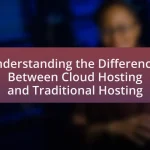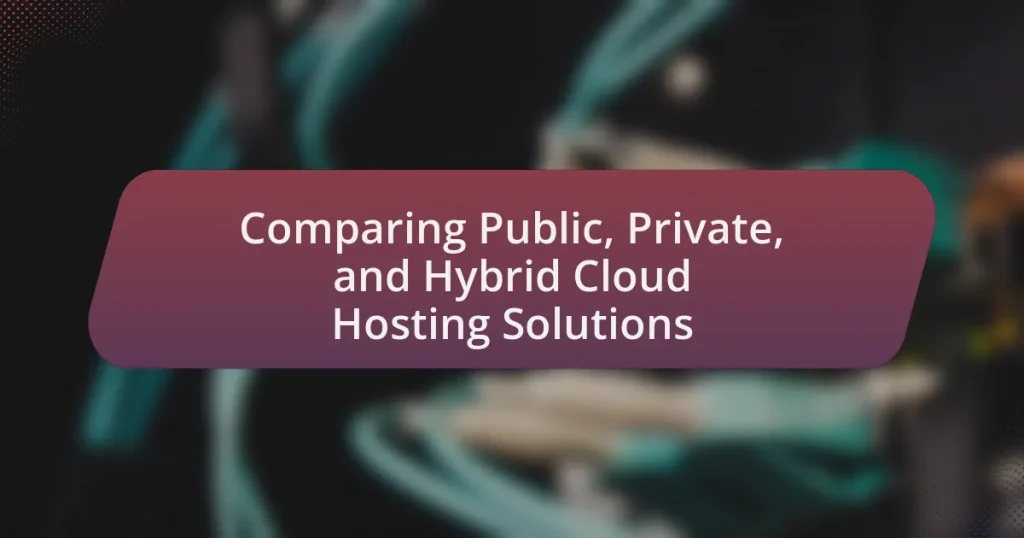Public, Private, and Hybrid Cloud Hosting Solutions represent distinct models of cloud computing tailored to varying organizational needs. Public cloud hosting offers shared resources over the internet, enhancing scalability and cost-effectiveness, while private cloud hosting provides dedicated resources for a single organization, ensuring greater control and security. Hybrid cloud hosting combines elements of both, allowing for flexible resource management and optimized performance. The article explores the defining characteristics, advantages, and challenges of each cloud hosting solution, as well as the factors influencing cost and security implications, guiding organizations in selecting the most suitable option based on their specific requirements.
What are Public, Private, and Hybrid Cloud Hosting Solutions?
Public, Private, and Hybrid Cloud Hosting Solutions are distinct models of cloud computing that cater to different organizational needs. Public cloud hosting involves services offered over the internet by third-party providers, allowing multiple users to share the same infrastructure, which enhances scalability and cost-effectiveness. Private cloud hosting, on the other hand, is dedicated to a single organization, providing greater control, security, and customization, often hosted on-premises or through a private data center. Hybrid cloud hosting combines elements of both public and private clouds, enabling data and applications to be shared between them, thus offering flexibility and optimized resource management. This classification is supported by industry reports indicating that 94% of enterprises use a cloud service, with many adopting hybrid solutions to balance performance and security needs.
How do these cloud hosting solutions differ from one another?
Public, private, and hybrid cloud hosting solutions differ primarily in their deployment models and resource accessibility. Public cloud solutions, such as Amazon Web Services and Microsoft Azure, offer shared resources over the internet, making them cost-effective and scalable for a wide range of users. Private cloud solutions, like VMware and OpenStack, provide dedicated resources for a single organization, enhancing security and control but often at a higher cost. Hybrid cloud solutions combine elements of both public and private clouds, allowing organizations to balance workloads and optimize resource use based on specific needs. This differentiation is crucial for businesses to choose the right solution based on their security, scalability, and budget requirements.
What are the defining characteristics of Public Cloud Hosting?
Public Cloud Hosting is characterized by its shared infrastructure, scalability, and pay-as-you-go pricing model. In this model, multiple users share the same physical resources, which allows for efficient resource utilization and cost-effectiveness. Scalability is a key feature, enabling users to easily adjust their resources based on demand, accommodating varying workloads without the need for significant upfront investment. The pay-as-you-go pricing model allows users to only pay for the resources they consume, making it financially accessible for businesses of all sizes. These characteristics make Public Cloud Hosting a flexible and economical solution for organizations looking to leverage cloud technology.
What are the defining characteristics of Private Cloud Hosting?
Private Cloud Hosting is characterized by its exclusive use of dedicated resources for a single organization, ensuring enhanced security and control. This model allows organizations to customize their infrastructure according to specific needs, providing flexibility in resource allocation. Additionally, Private Cloud Hosting often includes advanced security measures, such as firewalls and encryption, to protect sensitive data. According to a report by Gartner, organizations utilizing private clouds experience a 30% reduction in security incidents compared to public cloud environments, highlighting the effectiveness of its security features.
What are the defining characteristics of Hybrid Cloud Hosting?
Hybrid Cloud Hosting is characterized by its integration of both public and private cloud environments, allowing for greater flexibility and scalability. This model enables organizations to manage workloads across multiple environments, optimizing resource allocation based on specific needs. For instance, sensitive data can be stored in a private cloud while leveraging the public cloud for less critical applications, thus enhancing security and compliance. Additionally, Hybrid Cloud Hosting supports dynamic workload management, allowing businesses to scale resources up or down as demand fluctuates, which is particularly beneficial during peak usage times. This adaptability is supported by technologies such as cloud bursting, where applications can temporarily utilize public cloud resources to handle increased loads.
What are the advantages and disadvantages of each cloud hosting solution?
Public cloud hosting offers scalability and cost-effectiveness, allowing businesses to pay only for the resources they use. However, it presents disadvantages such as potential security risks and less control over data management. Private cloud hosting provides enhanced security and control, making it suitable for organizations with strict compliance requirements, but it can be more expensive and less scalable than public options. Hybrid cloud hosting combines the benefits of both public and private clouds, offering flexibility and optimized resource allocation, yet it can be complex to manage and may lead to integration challenges.
What benefits does Public Cloud Hosting provide?
Public Cloud Hosting provides scalability, cost-effectiveness, and accessibility. Organizations can easily scale resources up or down based on demand, allowing for efficient resource management. According to a report by Gartner, public cloud services are projected to grow by 23% in 2021, highlighting their increasing adoption due to lower operational costs compared to traditional hosting solutions. Additionally, public cloud services are accessible from anywhere with an internet connection, facilitating remote work and collaboration. This combination of benefits makes Public Cloud Hosting an attractive option for businesses looking to optimize their IT infrastructure.
What challenges are associated with Public Cloud Hosting?
Public cloud hosting presents several challenges, including security concerns, compliance issues, and potential downtime. Security is a significant challenge as data stored in the public cloud is accessible over the internet, making it vulnerable to cyberattacks; a report by McAfee indicates that 52% of organizations experienced a cloud security incident in 2020. Compliance issues arise because organizations must ensure that their data handling practices meet regulatory standards, which can be complex in a shared environment. Additionally, public cloud services can experience downtime, impacting business operations; for instance, Amazon Web Services reported outages that affected numerous businesses in 2020. These challenges necessitate careful consideration and management by organizations utilizing public cloud solutions.
What benefits does Private Cloud Hosting provide?
Private Cloud Hosting provides enhanced security, greater control, and improved performance compared to other hosting solutions. Organizations benefit from dedicated resources, which minimize the risk of data breaches and ensure compliance with regulations such as GDPR and HIPAA. Additionally, private clouds allow for customization tailored to specific business needs, enabling optimized resource allocation and scalability. According to a report by Gartner, 70% of organizations that adopt private cloud solutions experience increased operational efficiency, highlighting the effectiveness of this hosting model in meeting enterprise demands.
What challenges are associated with Private Cloud Hosting?
Private Cloud Hosting faces several challenges, including high initial costs, complex management, and scalability issues. The high initial costs arise from the need for dedicated hardware and infrastructure, which can be significantly more expensive than public cloud options. Complex management is required due to the need for specialized IT staff to maintain and operate the private cloud environment, which can lead to resource allocation challenges. Additionally, scalability can be limited compared to public clouds, as expanding capacity often requires additional hardware purchases and setup time, making it less flexible in responding to changing business needs.
What benefits does Hybrid Cloud Hosting provide?
Hybrid Cloud Hosting provides flexibility, scalability, and enhanced security. Organizations can leverage both public and private cloud resources, allowing them to scale their infrastructure according to demand while maintaining sensitive data in a secure private environment. This dual approach enables businesses to optimize costs by utilizing public cloud services for non-sensitive operations and private cloud for critical applications. Additionally, hybrid cloud solutions facilitate disaster recovery and business continuity by enabling data backup across multiple environments, ensuring that operations can continue seamlessly in case of an outage.
What challenges are associated with Hybrid Cloud Hosting?
Hybrid cloud hosting presents several challenges, including complexity in management, security concerns, and potential latency issues. The complexity arises from the need to integrate and manage both on-premises and cloud resources, which can lead to difficulties in maintaining consistent policies and procedures across environments. Security concerns stem from the increased attack surface, as data is transferred between public and private clouds, necessitating robust security measures to protect sensitive information. Additionally, latency issues may occur due to the reliance on internet connectivity for data transfer between different cloud environments, potentially impacting application performance. These challenges highlight the need for careful planning and management when implementing hybrid cloud solutions.
How do cost considerations impact the choice of cloud hosting solution?
Cost considerations significantly influence the choice of cloud hosting solution by determining the overall budget and resource allocation for businesses. Organizations often evaluate the total cost of ownership, which includes initial setup costs, ongoing operational expenses, and potential scalability costs. For instance, public cloud solutions typically offer lower upfront costs and a pay-as-you-go pricing model, making them attractive for startups and small businesses. In contrast, private cloud solutions may involve higher initial investments due to dedicated infrastructure but can lead to cost savings over time for larger enterprises with predictable workloads. Hybrid cloud solutions provide flexibility, allowing businesses to optimize costs by balancing between public and private resources based on specific needs. According to a report by Gartner, organizations can save up to 30% on IT costs by effectively leveraging cloud solutions, highlighting the critical role of cost considerations in cloud hosting decisions.
What factors influence the cost of Public Cloud Hosting?
The cost of Public Cloud Hosting is influenced by several key factors, including resource usage, service level agreements (SLAs), data transfer fees, and geographical location of data centers. Resource usage, which encompasses computing power, storage, and memory, directly correlates with pricing models that often charge based on consumption. Service level agreements define the level of service and support, impacting costs based on the guarantees provided. Data transfer fees arise from the movement of data in and out of the cloud, which can add significant expenses depending on usage patterns. Additionally, the geographical location of data centers can affect pricing due to regional operational costs and compliance requirements. These factors collectively determine the overall expense of utilizing public cloud services.
How does usage-based pricing work in Public Cloud Hosting?
Usage-based pricing in Public Cloud Hosting charges customers based on their actual consumption of resources, such as storage, compute power, and data transfer. This model allows users to pay only for what they use, making it cost-effective for businesses with fluctuating workloads. For instance, major providers like Amazon Web Services and Microsoft Azure offer detailed billing based on metrics like hours of server usage or gigabytes of data processed, enabling precise cost management. This pricing structure is validated by industry reports indicating that organizations can save up to 30% compared to fixed pricing models when they optimize their resource usage.
What hidden costs should be considered in Public Cloud Hosting?
Hidden costs in public cloud hosting include data transfer fees, storage costs, and unexpected charges for additional services. Data transfer fees can accumulate when moving data in and out of the cloud, often leading to significant expenses that are not initially apparent. Storage costs may increase due to the need for backups, redundancy, or scaling, which can exceed initial estimates. Additionally, charges for services such as monitoring, security, and technical support can add up, as these are often billed separately from the base hosting fees. According to a report by CloudHealth Technologies, organizations can experience up to 30% of their cloud spending as unplanned costs, highlighting the importance of understanding these hidden expenses.
What factors influence the cost of Private Cloud Hosting?
The cost of Private Cloud Hosting is influenced by several key factors, including hardware expenses, software licensing, maintenance costs, and the level of customization required. Hardware expenses encompass the physical servers and networking equipment necessary to support the cloud infrastructure, which can vary significantly based on performance and capacity needs. Software licensing costs arise from the need for operating systems, virtualization software, and management tools, which can also differ based on the vendor and features selected. Maintenance costs include ongoing support, updates, and potential hardware replacements, which contribute to the total cost of ownership. Additionally, the level of customization impacts costs, as highly tailored solutions often require more resources and expertise, leading to increased expenses. These factors collectively determine the overall pricing structure for Private Cloud Hosting solutions.
How do initial setup costs compare to ongoing operational costs in Private Cloud Hosting?
Initial setup costs in Private Cloud Hosting are typically higher than ongoing operational costs. The initial investment includes expenses for hardware, software, and infrastructure setup, which can range from tens of thousands to millions of dollars depending on the scale and requirements. In contrast, ongoing operational costs, which encompass maintenance, support, and utility expenses, are generally lower and more predictable, often amounting to a fraction of the initial setup costs. For example, a study by Gartner indicates that while initial setup can be substantial, ongoing costs may stabilize at around 15-30% of the initial investment annually, highlighting the significant disparity between the two cost phases.
What are the long-term financial implications of Private Cloud Hosting?
The long-term financial implications of Private Cloud Hosting include higher initial capital expenditures and ongoing operational costs, but potential savings in the long run due to increased efficiency and control. Organizations investing in private cloud solutions typically face significant upfront costs for hardware, software, and infrastructure setup, which can range from hundreds of thousands to millions of dollars depending on the scale. However, over time, private cloud hosting can lead to reduced operational costs through optimized resource utilization, enhanced security, and compliance with regulatory requirements, which can mitigate risks and avoid costly breaches. Additionally, companies can benefit from predictable budgeting and reduced dependency on third-party vendors, leading to better financial forecasting. According to a study by IDC, organizations that adopt private cloud solutions can achieve a 30% reduction in IT costs over a five-year period compared to traditional IT environments.
What factors influence the cost of Hybrid Cloud Hosting?
The cost of Hybrid Cloud Hosting is influenced by several key factors, including infrastructure requirements, data transfer costs, service provider pricing models, and the level of management and support needed. Infrastructure requirements encompass the hardware and software necessary to integrate both public and private cloud environments, which can vary significantly in cost. Data transfer costs arise from the movement of data between on-premises and cloud environments, with higher volumes leading to increased expenses. Service provider pricing models, which may include pay-as-you-go or subscription-based options, also play a crucial role in determining overall costs. Lastly, the level of management and support, whether self-managed or fully managed services, can significantly impact pricing, as more comprehensive support typically incurs higher fees.
How does the combination of Public and Private Cloud affect overall costs?
The combination of Public and Private Cloud, often referred to as Hybrid Cloud, can lead to overall cost savings by optimizing resource allocation and reducing capital expenditures. Organizations can leverage the scalability and cost-effectiveness of Public Cloud for variable workloads while utilizing Private Cloud for sensitive data and applications that require higher security and compliance. This strategic approach allows businesses to avoid over-provisioning resources, as they can dynamically adjust their usage based on demand. According to a report by Gartner, companies that adopt a Hybrid Cloud strategy can reduce their IT costs by up to 30% by balancing workloads between Public and Private environments, thus maximizing efficiency and minimizing unnecessary expenses.
What are the potential savings from using Hybrid Cloud Hosting?
Hybrid Cloud Hosting can lead to significant savings, primarily through reduced infrastructure costs and optimized resource allocation. By combining on-premises infrastructure with public cloud resources, organizations can scale their IT resources according to demand, avoiding the expense of over-provisioning. For instance, a study by the International Data Corporation (IDC) found that businesses utilizing hybrid cloud solutions can save up to 30% on IT costs compared to traditional on-premises setups. Additionally, hybrid cloud hosting allows for better disaster recovery options, which can further reduce costs associated with downtime and data loss.
What are the security implications of each cloud hosting solution?
Public cloud hosting solutions generally present a higher risk of data breaches due to shared infrastructure, making them more vulnerable to attacks. In contrast, private cloud hosting offers enhanced security through dedicated resources, allowing for greater control over data and compliance with regulations. Hybrid cloud solutions combine elements of both public and private clouds, which can lead to security complexities as data moves between environments, necessitating robust security measures to protect sensitive information. Each solution’s security implications are influenced by factors such as data sensitivity, regulatory requirements, and the organization’s ability to implement security protocols effectively.
How does Public Cloud Hosting address security concerns?
Public Cloud Hosting addresses security concerns through a combination of advanced security measures, compliance with industry standards, and continuous monitoring. Major public cloud providers implement robust encryption protocols for data at rest and in transit, ensuring that sensitive information is protected from unauthorized access. Additionally, these providers often adhere to strict compliance frameworks such as GDPR, HIPAA, and ISO 27001, which mandate specific security practices and audits. For instance, Amazon Web Services and Microsoft Azure regularly undergo third-party security assessments to validate their security controls, demonstrating their commitment to maintaining a secure environment. Furthermore, public cloud platforms utilize automated security tools and threat detection systems that continuously monitor for vulnerabilities and potential breaches, allowing for rapid response to any security incidents.
What security measures are typically implemented in Public Cloud Hosting?
Public cloud hosting typically implements security measures such as data encryption, identity and access management, and regular security audits. Data encryption protects sensitive information both at rest and in transit, ensuring that unauthorized users cannot access it. Identity and access management controls who can access cloud resources, utilizing multi-factor authentication and role-based access controls to enhance security. Regular security audits help identify vulnerabilities and ensure compliance with industry standards, such as ISO 27001 and GDPR, which further reinforce the security posture of public cloud environments.
What are the common security risks associated with Public Cloud Hosting?
Common security risks associated with Public Cloud Hosting include data breaches, loss of control over data, and insecure APIs. Data breaches occur when unauthorized individuals gain access to sensitive information stored in the cloud, which has been highlighted by incidents such as the 2019 Capital One breach affecting over 100 million customers. Loss of control over data arises because users rely on third-party providers to manage their data, increasing the risk of mismanagement or exposure. Insecure APIs can lead to vulnerabilities, as they are often the primary means of interaction with cloud services, making them attractive targets for attackers. These risks underscore the importance of implementing robust security measures in public cloud environments.
How does Private Cloud Hosting enhance security?
Private Cloud Hosting enhances security by providing dedicated resources and isolated environments for each organization. This isolation minimizes the risk of data breaches and unauthorized access, as resources are not shared with other tenants, unlike in public cloud environments. Additionally, private clouds allow for customized security protocols tailored to specific organizational needs, including advanced firewalls, intrusion detection systems, and encryption methods. According to a report by Gartner, organizations using private cloud solutions experience a 30% reduction in security incidents compared to those using public cloud services, highlighting the effectiveness of dedicated infrastructure in enhancing security.
What security features are unique to Private Cloud Hosting?
Private Cloud Hosting offers unique security features such as dedicated resources, enhanced data isolation, and customizable security protocols. These features ensure that organizations have exclusive access to their computing resources, reducing the risk of data breaches associated with shared environments found in public clouds. Additionally, private clouds allow for tailored security measures, including specific firewall configurations and access controls, which can be adjusted to meet the unique compliance requirements of different industries. This level of customization and control is not typically available in public cloud solutions, making private cloud hosting a more secure option for sensitive data management.
How does Private Cloud Hosting mitigate risks compared to Public Cloud?
Private Cloud Hosting mitigates risks compared to Public Cloud by providing enhanced security, greater control over data, and compliance with regulatory requirements. In a Private Cloud environment, resources are dedicated to a single organization, reducing the risk of data breaches and unauthorized access that can occur in a shared Public Cloud infrastructure. Additionally, Private Cloud allows organizations to implement customized security protocols and access controls tailored to their specific needs, further minimizing vulnerabilities. According to a 2021 report by Gartner, organizations using Private Cloud solutions experienced 60% fewer security incidents than those relying on Public Cloud services, highlighting the effectiveness of Private Cloud in risk mitigation.
What security measures are essential for Hybrid Cloud Hosting?
Essential security measures for Hybrid Cloud Hosting include data encryption, identity and access management, network security, and compliance with regulatory standards. Data encryption protects sensitive information both at rest and in transit, ensuring that unauthorized access is prevented. Identity and access management systems control user permissions and authentication, reducing the risk of insider threats. Network security measures, such as firewalls and intrusion detection systems, safeguard against external attacks. Compliance with regulatory standards, such as GDPR or HIPAA, ensures that the hosting environment meets legal requirements for data protection, thereby enhancing overall security.
How can organizations ensure data security in a Hybrid Cloud environment?
Organizations can ensure data security in a Hybrid Cloud environment by implementing robust encryption protocols for data at rest and in transit. This approach protects sensitive information from unauthorized access, as encryption transforms data into a format that is unreadable without the appropriate decryption key. Additionally, organizations should utilize identity and access management (IAM) solutions to control user permissions and monitor access to data across both on-premises and cloud environments. According to a report by the Cloud Security Alliance, 64% of organizations cite data loss as a significant concern in hybrid cloud setups, highlighting the importance of these security measures. Regular security audits and compliance checks further enhance data protection by identifying vulnerabilities and ensuring adherence to industry standards.
What are the security challenges specific to Hybrid Cloud Hosting?
Hybrid cloud hosting faces several security challenges, primarily due to its integration of both public and private cloud environments. One significant challenge is data security, as sensitive information may be transferred between different cloud environments, increasing the risk of data breaches. According to a 2021 report by the Cloud Security Alliance, 64% of organizations reported that data loss or leakage was a major concern in hybrid cloud setups.
Another challenge is compliance and regulatory issues, as organizations must ensure that their hybrid cloud configurations meet various legal and industry standards across different jurisdictions. This complexity can lead to gaps in compliance, which can result in legal penalties.
Additionally, identity and access management becomes more complicated in hybrid environments, as multiple platforms require consistent authentication and authorization protocols. A study by McKinsey & Company highlighted that 70% of security breaches stem from inadequate identity management practices.
Lastly, the shared responsibility model in hybrid cloud hosting can lead to confusion regarding security responsibilities between the cloud provider and the organization, potentially leaving vulnerabilities unaddressed.
What are the best practices for choosing the right cloud hosting solution?
The best practices for choosing the right cloud hosting solution include assessing your specific business needs, evaluating the provider’s reliability and performance, and considering security and compliance requirements. First, understanding your workload requirements, such as scalability and resource allocation, helps in selecting a solution that aligns with your operational goals. Second, analyzing the cloud provider’s uptime history and performance metrics ensures that your applications will run smoothly and without interruptions; for instance, a provider with a 99.99% uptime guarantee is generally more reliable. Lastly, reviewing the security measures and compliance certifications, such as ISO 27001 or GDPR adherence, is crucial to protect sensitive data and meet regulatory standards. These practices collectively guide organizations in making informed decisions about their cloud hosting solutions.
What key factors should organizations consider when selecting a cloud hosting solution?
Organizations should consider scalability, security, compliance, cost, and support when selecting a cloud hosting solution. Scalability ensures that the solution can grow with the organization’s needs, allowing for increased resources without significant downtime. Security is critical, as organizations must protect sensitive data; thus, evaluating the provider’s security measures, such as encryption and access controls, is essential. Compliance with industry regulations, such as GDPR or HIPAA, is necessary to avoid legal issues and ensure data protection. Cost analysis helps organizations understand the total cost of ownership, including hidden fees and long-term expenses. Finally, the level of support provided by the cloud hosting provider is vital for resolving issues quickly and maintaining operational efficiency. These factors collectively guide organizations in making informed decisions about their cloud hosting solutions.
How do business needs influence the choice of cloud hosting?
Business needs significantly influence the choice of cloud hosting by determining the required level of scalability, security, and cost-effectiveness. For instance, organizations with fluctuating workloads may prefer public cloud solutions for their flexibility and lower upfront costs, while businesses handling sensitive data often opt for private clouds to ensure enhanced security and compliance with regulations. Additionally, hybrid cloud solutions are increasingly chosen by companies seeking a balance between the two, allowing them to manage sensitive data in a private environment while leveraging the public cloud for less critical operations. This alignment of cloud hosting options with specific business requirements ensures optimal resource utilization and operational efficiency.
What role does scalability play in selecting a cloud hosting solution?
Scalability is crucial in selecting a cloud hosting solution as it determines the ability to adjust resources based on demand. A scalable cloud hosting solution allows businesses to efficiently manage varying workloads, ensuring optimal performance during peak times without incurring unnecessary costs during low-demand periods. For instance, according to a report by Gartner, organizations that leverage scalable cloud solutions can reduce infrastructure costs by up to 30% while maintaining service quality. This adaptability is essential for businesses experiencing growth or seasonal fluctuations, making scalability a key factor in the decision-making process for cloud hosting.
What common mistakes should be avoided when choosing a cloud hosting solution?
Common mistakes to avoid when choosing a cloud hosting solution include underestimating costs, neglecting scalability, and overlooking security features. Underestimating costs can lead to unexpected expenses; for instance, many providers have hidden fees that can significantly increase the total cost of ownership. Neglecting scalability may result in performance issues as business needs grow; a study by Gartner indicates that 70% of organizations face challenges in scaling their cloud infrastructure effectively. Overlooking security features can expose sensitive data to breaches; according to a report by McAfee, 52% of organizations experienced a cloud-related security incident in the past year.
How can organizations ensure they are not overspending on cloud services?
Organizations can ensure they are not overspending on cloud services by implementing robust cost management strategies. These strategies include regularly monitoring usage and expenses through cloud cost management tools, establishing budgets and alerts for spending thresholds, and optimizing resource allocation by rightsizing instances based on actual needs. According to a report by Gartner, organizations can save up to 30% on cloud costs by utilizing these practices effectively.
What are the risks of not conducting a thorough needs assessment?
Not conducting a thorough needs assessment poses significant risks, including misalignment of cloud solutions with organizational requirements. This misalignment can lead to inefficient resource allocation, resulting in increased operational costs and underutilization of cloud services. For instance, a study by Gartner indicates that organizations can waste up to 30% of their cloud spending due to improper service selection and configuration. Additionally, without a clear understanding of needs, organizations may face security vulnerabilities, as they might overlook essential compliance and data protection measures. This can expose sensitive information to breaches, leading to legal repercussions and reputational damage. Overall, the absence of a comprehensive needs assessment can severely hinder an organization’s ability to leverage cloud technology effectively.
What practical tips can help organizations optimize their cloud hosting choice?
Organizations can optimize their cloud hosting choice by conducting a thorough assessment of their specific needs, including performance requirements, budget constraints, and compliance obligations. This assessment allows organizations to identify whether a public, private, or hybrid cloud solution best aligns with their operational goals.
Additionally, organizations should evaluate the scalability options of each cloud provider, ensuring that the chosen solution can grow with their business demands. Cost analysis is crucial; organizations must compare pricing models and potential hidden costs associated with data transfer, storage, and support services.
Security features should also be a priority; organizations need to verify that the cloud provider meets industry standards and regulations relevant to their sector. Finally, organizations should consider the level of support and service level agreements (SLAs) offered by the provider, as these can significantly impact operational efficiency and reliability.
How can organizations effectively evaluate different cloud hosting providers?
Organizations can effectively evaluate different cloud hosting providers by assessing key criteria such as performance, security, compliance, and cost. Performance can be measured through uptime guarantees and speed benchmarks, with many providers offering Service Level Agreements (SLAs) that specify these metrics. Security is critical; organizations should examine the provider’s security certifications, data encryption practices, and incident response protocols. Compliance with industry regulations, such as GDPR or HIPAA, is essential for organizations handling sensitive data, and providers should demonstrate adherence to these standards. Cost evaluation involves analyzing pricing models, including pay-as-you-go versus subscription options, and understanding any hidden fees associated with data transfer or storage. By systematically reviewing these factors, organizations can make informed decisions that align with their specific needs and risk profiles.
What resources are available for organizations to learn more about cloud hosting solutions?
Organizations can access various resources to learn more about cloud hosting solutions, including online courses, webinars, whitepapers, and industry reports. For instance, platforms like Coursera and Udemy offer courses specifically focused on cloud computing and hosting, while organizations like Gartner and Forrester provide comprehensive research reports that analyze different cloud hosting models, including public, private, and hybrid solutions. Additionally, cloud service providers such as Amazon Web Services, Microsoft Azure, and Google Cloud offer extensive documentation, tutorials, and case studies that help organizations understand their cloud hosting options and best practices.










